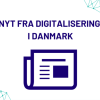Digital pseudo-work: spending too much time on meaningless tasks

What is pesudo-work?
Too many time-consuming meetings that don't lead to anything, reports that don't get read and redundant procedures and registrations. Do you recognise this? Pseudo-work comes in all shapes and sizes, and it certainly exists in your workplace. But how do we get rid of it? After all, there are just as many 'important' meetings in the calendar and to-dos on the list today as there were yesterday? According to Dennis Nørmark, consultant, speaker and bestselling author of the books: "Pseudowork - how we got busy doing nothing" and "Back to work - how to fight pseudowork in organizations", we spend far too much time on trivial tasks that may sound important, but that we know don't really change anything.
Digitalisation in particular often generates a lot of pseudo-work, unimportant and non-value-adding extra work. Digitalisation often becomes an opportunity to do something faster and smarter, but we forget to ask ourselves if there is actually a problem before we create the new "solution" - and because we talk about digitalisation as something inevitable, we have to get on board. Then we end up perceiving the new digital solution as yet another place where we have to register things we were already doing, instead of a tool that actually helps us in our work, says Dennis Nørmark. In his book "Back to work - how to combat pseudo-work in organizations", Nørmark dedicated an entire chapter on how to prevent IT from becoming pseudo-work.
Pseudowork makes for frustrated employees
Pseudo work is work that has lost touch with reality. It is work that on the surface looks like real work and is worthy of recognition, but doesn't leave anything valuable, useful or significantly improve anything. We know that for the employee, this creates frustration and feelings of worthlessness and sometimes the feeling of putting on a show when at work: being busy with tasks that sound important, but realising these tasks don't really change anything.
Lifting a taboo
Dennis Nørmark found the inspiration for the book "Pseudowork - how we got busy doing nothing" from his own working life. He began to experience how people filled their time with things that weren't important, but that no one dared to put a stop to, and then they just kept going.
"When my co-author and I started asking people if they felt the same way, it was like a huge taboo was lifted. Finally, people could talk about the fact that they often didn't really know why they were doing what they were doing or what it was for. When the book came out, we received hundreds of people saying that they actually did very little when they were at work. They may have been busy, but what they were busy doing wasn't important. It could easily be dispensed with."
For the citizens' sake or our own?
In the public sector, many people feel that they are asked to do things that have very little connection to the core task. They feel like they have to perform a lot of tasks that mostly benefit management and only secondarily benefit themselves - and even more rarely the citizens they are supposed to be working for.
For example, a doctor may have to perform nutritional screening and case screening on patients simply because someone needs to improve some numbers in the area, but neither the doctor nor the patient find it particularly relevant. There are also far more projects initiated than can be successfully completed and where the professional output is very limited. This creates a situation where frontline staff feel that they are wasting their time, and as a result end up doing the real work, as so-called "shadow work", outside of working hours.
Advice from Dennis Nørmark: be more concrete
According to Nørmark, it's important to think more in terms of tools than solutions and get closer to the people who need them. Software development, for example, has been talked about for a long time, but we often don't end up there because IT has become prestige projects that managers must wing it - and then it takes place in a bubble away from those who actually need it. For example, take a critical look at the buzzwords that can make local government officials decide to integrate machine learning in the municipality simply because they have heard it’s the new ‘thing’ to do.
Nørmark advises to speak more concretely and not be afraid to ask stupid questions. If there is something we don't understand, especially regarding IT and new technologies, we shouldn't be afraid to ask questions to help us can actually understand. We must not make digitalisation a black box for the chosen few - we must help each other understand the actual needs.
More from Nørmark
On September 6, 2021, Dennis Nørmark spoke at OffDig, where he shared his many views on pseudo-work, IT and digitalisation. Watch the video recording from Dennis Nørmark’s presentation at the Danish IT OffDig 2021 conference: If digitalisation is the answer, what is the question?






